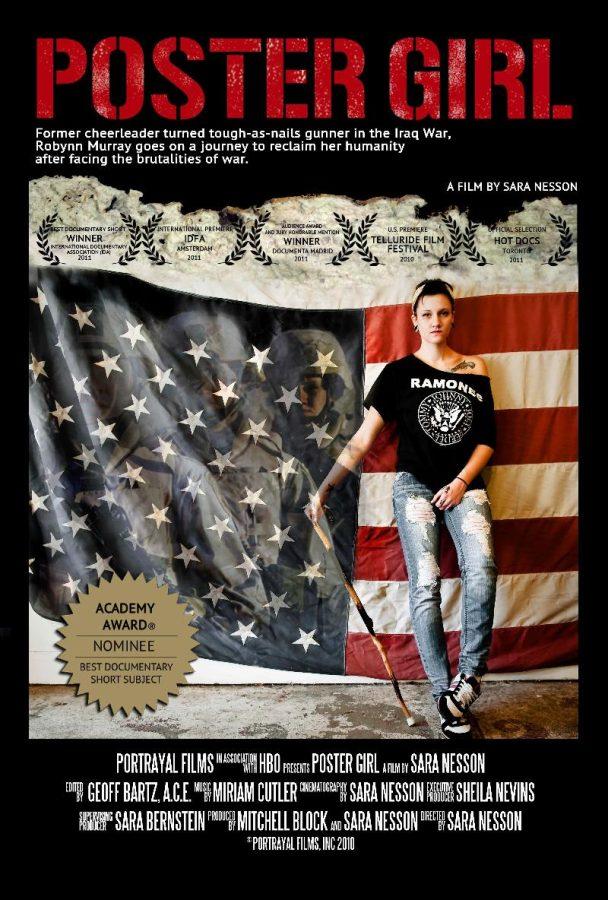Robyn Murray entered the Army as an honors student, cheerleader, ROTC member, and National Merit Scholar. During her tour, she worked as a machine gunner for a Civil Affairs unit, where she pointed her weapon at children and investigated the gore-splattered homes of dead Iraqis. She became a model soldier featured on the cover of Army Magazine. But when she was discharged, she was a wreck, crippled physically and emotionally.
On Nov. 1, UMass Boston’s Honors Program students and their teacher Chico Colvert, a UMass Boston graduate and local film maker, presented the documentary “Poster Girl.” The movie is a 38-minute short about Murray’s post-war struggles with PTSD, hip and back injuries, and the VA, which at one point owed her over $27,000 in disability pay. Murray and the film’s director, Sara Nesson, were present to answer questions.
Nesson met Murray through the Combat Paper Project, an organization that teaches veterans to make paper out of their uniforms and turn it into artwork. The project took Murray to Martha’s Vineyard, where Nesson was filming participating veterans for another documentary she hoped to make.
Neither Murray nor Nesson ever expected “Poster Girl” to be filmed, or to achieve the critical acclaim that it has. Murray recalls thinking she’d be one of many soldiers in Nesson’s finished work, only to get a call from the director years later, saying “I made this film all about you, and I think HBO wants to buy it!”
There was a long pause before Murray said, “Super!”
The camera follows Murray around Rochester, NY, where she moved in order to be closer to the VA office while trying to process her application for benefits. Stills and videos of Murray wearing her uniform in Iraq are spliced into footage of her heavily-tattooed and always wearing black. The stills show an enthusiastic member of the armed services, while the footage is of a young woman protesting with Iraq Veterans Against the War at the Democratic National Convention.
What’s most striking about the movie is how open Murray was to letting Nesson in on every moment of her life. Nesson explained to the audience that other vets didn’t want her around on their bad days. “They’d be like ‘Get the camera out of my face! I’m having a shitty day!’” Because of her experiences with the other vets, “The first thing I thought was, ‘I really hope she doesn’t kill me!’” But Murray didn’t. She let Nesson follow her around while she screamed and cried and punched walls. “I always had the camera running because when I turned it off, she’d say something amazing.”
“Poster Girl” has received an Academy Award nomination for Best Documentary Short, as well as two Emmy nominations. The documentary is powerful and moving, but Nesson says she is “shocked” at the sudden success.
Murray, too, is surprised by her rise to fame. “I can’t watch the movie. I hate watching it,” she said to the gathered audience. “It feels weird.” She explained that she feels she’s grown out of the person she was when filming ended in 2010, and she doesn’t want to be recognized in real life by people who see her on the screen.
“I’m really glad I cut my hair,” she laughed nervously. But the truth is that nobody would have recognized her anyway. Since the film ended in 2010, Murray has kicked her addiction to painkillers, and has gone from constant panic attacks to constant public speaking engagements. She’s made friends with other veterans and with Nesson, who describes her as “like a sister.” Murray and Nesson even went together to get Nesson her first tattoo.
Having the star of the film present served to drive home the message that people can and do recover from the worst trauma. Murray has been a poster girl for women in combat as well as for combat-related PTSD, but now she comes across as a normal, happy, loved and loving 27-year old woman.





















































